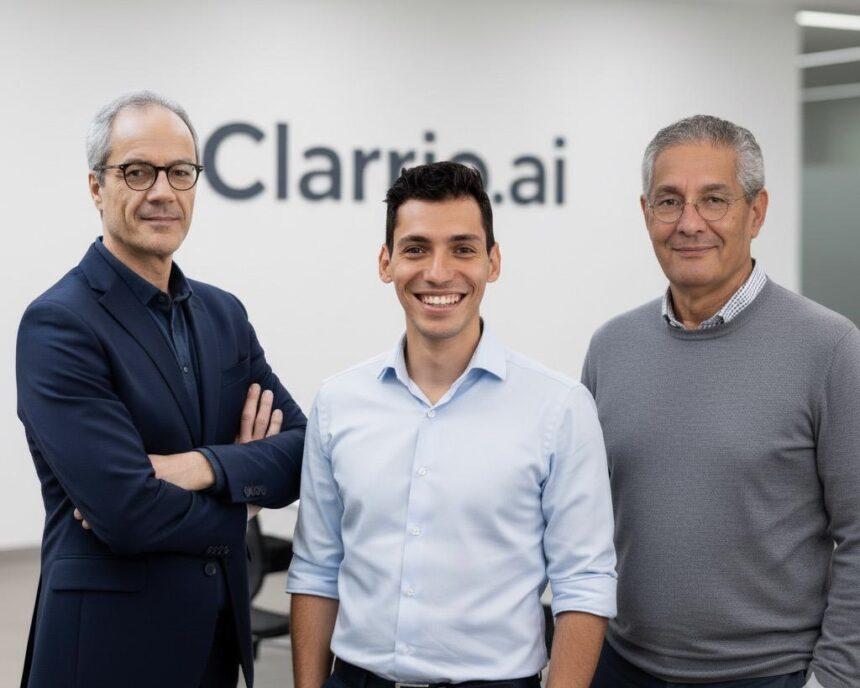Clarrio.ai, a predictive analytics startup, is using artificial intelligence to bridge Africa’s health data gap. The platform turns real-time physiological, behavioural, and environmental signals into predictive insights.
Originally launched in 2023 as Knowlepsy, the platform was inspired by the personal journey of CEO and founder Firas Rhaiem. His sister suffered frequent epileptic seizures, but her doctors lacked vital data on seizure patterns and environmental triggers.
“We saw that no one had data not only for epilepsy but for all chronic diseases,” Rhaiem said. “If you leave the hospital, you’re disconnected.”
By building a tool to aggregate her records, Rhaiem helped reduce her seizures from weekly episodes to years without one.
How Clarrio Works
Recognising the wider challenge, Knowlepsy was rebranded to Clarrio, expanding from a niche epilepsy platform into a device-agnostic data aggregation system designed for chronic diseases of all kinds.
The startup says the platform helps patients track personal health triggers through wearables while giving hospitals and pharmaceutical firms AI-driven dashboards for risk alerts and treatment planning.
At the heart of the platform is KnowRisk, Clarrio’s core application suite. For patients, it connects with wearable devices such as smartwatches to log real-time environmental and physiological data; covering sleep, stress, mood, menstrual cycles, and heart rate variability.
The system processes this data using Convolutional Neural Networks (CNNs) for pattern recognition and Long Short-Term Memory (LSTM) networks for predictive analysis. Large Language Models (LLMs) further extract insights from the data, enabling the platform to identify personal triggers and provide preventive recommendations.
“I’m not selling prediction,” Rhaiem adds. “I’m selling access to health data. If you have access to data, everything will become more personalised. Once personalised, the biggest winner is the entire healthcare system and the patients.”
What You Should Know
Clarrio is compatible with more than 300 devices, ranging from Apple and Huawei to Fitbit and Xiaomi, and also integrates with its own supplied wearables.
For hospitals and pharmaceutical companies, Clarrio’s KnowRisk offers a Software-as-a-Service (SaaS) dashboard that combines patient-generated data with clinical records, generating AI-powered risk alerts.
Clarrio operates strictly on a business-to-business (B2B) model. While patients and doctors use the service for free, health systems, insurers, and pharmaceutical companies pay between $942 and $1,178 annually per patient, with options for enterprise contracts.
According to Clarrio, it has already onboarded more than 500 patients and is active in Tunisia, Qatar, and South Africa. It works with Sidra Medicine and Hamad Medical Corporation in Qatar, as well as Netcare Hospitals in Johannesburg. It has also partnered with Microsoft, which lists and supports the platform on its global marketplace.
Backed by over $1 million in equity funding from angel investors and senior executives from Microsoft and Google, Clarrio reports promising results: a 78.9% accuracy rate in detecting seizure triggers and a 30% reduction in emergency visits.
What This Means
A 2021 report by the World Health Organisation (WHO) revealed that nearly two-thirds of African countries lack the infrastructure to accurately record births and deaths, while data on non-communicable diseases remains even thinner.
For patients living with chronic conditions, this information gap disrupts treatment, limits research, complicates drug development, and weakens long-term health system planning.
According to industry leaders, Clarrio is redefining how chronic diseases are monitored and managed beyond hospital walls.
The company faces competition from industry heavyweights such as Flatiron Health, Verily, and IQVIA. However, it differentiates itself by focusing on chronic diseases and leveraging data collected outside hospital settings, producing a real-world dataset.
Looking ahead, Clarrio plans to expand, with ambitions to broaden its coverage to cancer and autoimmune diseases. The company also intends to enable anonymised data sharing, supporting the next wave of healthtech startups and strengthening global healthcare systems.
Talking Points
It is noteworthy that Clarrio began as a niche solution for epilepsy before expanding into a broad chronic disease management platform. This pivot shows both adaptability and a keen understanding of Africa’s wider healthcare challenges.
By transforming real-time signals from wearable devices into predictive insights, Clarrio is positioning itself as more than a healthtech app, it’s becoming an enabler of proactive healthcare. This could shift patient management from reactive hospital visits to continuous, preventive monitoring.
At Techparley, we see Clarrio’s device-agnostic approach as a strength. Interoperability with over 300 wearables makes it more inclusive and practical, particularly in regions where patients use diverse technologies.
The company’s B2B model, offering the platform free for patients and doctors while charging institutions, may accelerate adoption. If executed well, Clarrio could play a defining role in closing Africa’s health data gap, reducing emergency visits, and creating a foundation for personalised healthcare.





